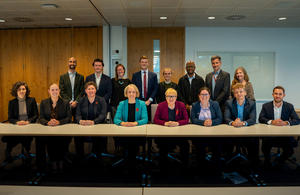UK breeds success with good genes in livestock genetics market
Agri-food attachés secure new export opportunity in Kenyan market for British sheep and goat genetics worth around £700,000 a year

Environment Secretary Emma Reynolds, Minister for Food Security Dame Angela Eagle and the government's agri-food attachés
UK sheep and goat breeders have gained access to Kenya’s estimated 46 million-strong livestock market after the UK government struck a deal on exporting genetic material.
The agreement – worth around £700,000 a year according to industry estimates – will help address Kenya’s growing demand for high-quality breeding stock as the country works to improve food sufficiency for its rapidly expanding population.
Kenya’s sheep and goat numbers are predicted to rise significantly in coming years, creating sustained demand for the UK’s world-leading genetics.
From Angus beef and Large White pigs to Suffolk sheep and Dorking chickens, the UK has long been a centre for genetics research, with its pioneering technologies and methods making livestock genetics highly sought after globally for their diversity, resilience and quality.
Industry estimates that UK breeding stock forms the basis for over 70% of the world’s poultry, while UK bovine genetics are being exported to every continent, enabling access to more than 100 countries worldwide.
Minister for Food Security Dame Angela Eagle said:
UK livestock genetics have earned a global reputation for excellence, with countries around the world seeking out our breeding stock to strengthen their agricultural sectors and improve food security.
It was a pleasure to meet with our agri-attachés last week and hear first-hand about the excellent work they are doing to champion UK agriculture across the globe.
This new opportunity with Kenya demonstrates the global demand for the high quality that defines UK agriculture. This is exactly the kind of international collaboration that strengthens both our agricultural sector and our trading relationships worldwide as part of our Plan for Change.
The agreement builds on demand for a range of UK genetics. UK rams derived from imported embryos are selling for record prices in Argentina, while UK pig breeders have pioneered the use of frozen semen to export high-quality genetics to countries affected by African Swine Fever, significantly reducing the disease risks associated with transporting live animals. Earlier this year, Turkmenistan opened up its market to the UK for high-value poultry genetics, worth a quarter of a million pounds a year.
These latest trade agreements demonstrate a significant economic opportunity for the UK’s premium poultry and livestock to meet growing global demand for quality breeding stock, expanding international trade as part of the government’s Plan for Change.
Marcus Bates, Industry Chair UK Export Certification Partnership, said:
The network that we have built up through partnership working is now delivering great results for UK livestock genetics exporters.
Industry funding from companies and levy boards is matched with the support of the Market Access and Veterinary Trade Facilitation teams and now with the support of the agri-attachés worldwide, we are able to compete with the USA and some EU countries who have been using agri-attachés for many years.
Richard Griffiths, Chief Executive, British Poultry Council said:
70% of the world’s poultry is rooted in high-value UK breeding stock, an export industry estimate is worth £320 million. Combined with full traceability, renowned standards, and strong trade opportunities, British poultry genetics are key to global food security.
Our trade attachés play a vital role in that success, championing British poultry meat worldwide. Since 2024, they have kept food trade moving during periods of avian influenza, secured various regionalisation agreements, and have opened Turkmenistan for high-value genetics worth a quarter of a million pounds – ensuring British poultry continues to reach people around the world. We look forward to continuing our close work together.
The agreement is credit to Defra’s agri-attachés and follows a recent industry engagement week, where the agri-attaché network met with producers whose interests they represent overseas.
These industry meetings help attachés understand the experiences of UK exporters and identify new opportunities in their respective territories, enabling the UK to compete in important global markets.